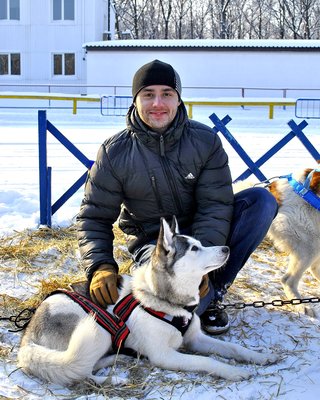Artem Marchenko, M.S., on Teaching, Learning, and Healing - The Savior's Way
March 15, 2023

Artem Marchenko has always loved science. He can recall his sixth grade chemistry class- the first he ever took - and his passion for mathematics, physics, and chemistry as a child growing up in Ukraine. Now a return missionary and BYU PhD student, Marchenko is acquiring as much knowledge as he can to help him achieve his goal of creating life-saving, cancer-combative drugs - a journey that he says, has taught him much about Christ-like living and patience.
“I knew that I wanted to be a chemist,” Marchenko says. Originally majoring in analytical chemistry for his undergraduate and master’s degrees at the National University of Kharkiv, he chose to switch emphases and now studies organic chemistry. “Anything that contains carbon is organic, like foods, all the materials around us…I want to work in the drug industry; I want to make anti-cancer drugs. Currently, my project is not related with this and I’m just learning lots of organic reactions.” Rather than developing drugs, Marchenko is currently working with the Daniel Ess and Michaelis labs to develop optimal catalysts for ethane-alcohol conversion. This research is helping him gain exposure to the world of organic chemistry and learn how to create compounds that will be essential in his future career. “I am…grateful to do any kind of chemistry to learn more and more…I wanted to learn something new, like get more skills in different subdisciplines.”
Not only will his experience transfer well to other projects; Marchenko’s research holds great potential for improving the efficiency of fuel and natural gas production. “There are two ways to convert natural gas into fuels and chemicals. There is synthesis gas; it’s basically CO and H2, which are converted from natural gas, but it takes lots of energy and lots of money to convert it. So, we’re trying to do it through this process [that] uses [lower] temperatures, less energy, and by developing specific catalysts we can make this process cheaper and more efficient.” With gas and fuel prices in flux and inflated, Marchenko’s research and catalysts could have significant positive repercussions on the fuel industry and consumers alike, helping to create a greener, energy-friendly, cost-effective standard in America and around the world.
As is the norm, though, Marchenko has experienced setbacks in his research. The process of creating the right machinery, conducting repairs, and waiting for shipments of parts has interrupted his experiments more than once. Adjusting to a new lab environment and university culture has also been a learning process. “The culture is different in my school, and here we have lots of people in lab and I have to communicate with all of them. Sometimes we have misunderstandings, we have to be super patient with everyone…In Ukraine, my research didn’t depend on lots of people.” On top of adjusting to a new lab environment, the transition to a new field of emphasis has also proven a challenge Marchenko has had to face. “The hardest thing is probably [that] this field is just new for me. Everything sounds and looks so hard for me, I need to memorize a lot, I have to learn how to apply it and also have a TA assignment. I need to learn how to actually teach it, not normally just learn it for myself.”
Rather than be daunted by these challenges, however, Marchenko has chosen to face these obstacles with remarkable tenacity and attitude. Seeking knowledge from wherever he can find it, he finds joy in learning with his students and acquiring new skills that have helped him learn to navigate a new lab dynamic and find his niche. He attributes much of this to his mentor, Dr. David Michaelis, and other university professors who he describes as “patient, very calm, and very supportive; literally, Christlike.”
“We have three rules in our lab,” Marchenko explains, “First rule: don’t die. And it’s like, don’t die spiritually. Remember to keep yourself up spiritually, remember who you are and try to be nice…try to be Christlike.” He describes the positive distinctions of BYU culture, saying that Dr. Michaelis “talks about the gospel and different things during our meetings, and first it was a little bit strange to me…it was very strange to me that lots of people even prayed before chemistry classes. It’s a weird feeling, but I loved it.” Marchenko says this rule and the BYU emphasis to stay spiritually strong has helped him become a better person, contributing to his positive experience in the university’s chemistry program.
The other two rules are equally as valuable and delightful. “Don’t die physically…you need to be aware of all the things in lab because we have some explosive chemicals. The third one: ‘don’t be a jerk.’ If you leave some stuff [out] that you used, get rid of it. Don’t leave trash behind yourself, help others if they need your help, just be supportive. That’s what it means.”
He describes that these lab rules were especially helpful to him in his first days of his PhD program. “When I moved here, I was super stressed to present, to talk with new people. I didn’t have much opportunity in Ukraine to have presentations…here, you just present a lot, prepare to make all those presentations, communicate with people. I was so nervous to talk to so many people, and [Michaelis] was so supportive.” The positive, patient, motivated, and reassuring examples of his advisors has set a good example and created a cooperative environment unique to BYU that has certainly had an effect on Marchenko. “I definitely want to [learn] with [Michaelis] and then one day I can be that excited about chemistry like him,” he says.
With that enthusiasm clearly evident in Marchenko as he pursues his academic goals and career hopes, he brightly offers sincere advice to fellow students considering working toward a graduate degree. “I’ll just relate it to how I decided to switch from analytical chemistry to organic chemistry. When I was on my mission [in Moldova], I wasn’t sure that I wanted to go to grad school. But then I was thinking in my brain, ‘What should I do for my future career?’ because I’d already gotten my master’s degree. And then I felt that I wanted to do something with my career that would help other people and change the world. I felt that, somehow, I wanted to help other people to heal them. Maybe [because] I was on my mission and my mind was influenced by that, I thought [that] if Jesus were a chemist…right now, if He were walking on earth, if He were a chemist he would be making medicine or something, and it’s like, ‘Okay, I think I want to be an organic chemist and synthesize drugs in the future.’ So, my advice: it might [not] be a big, huge idea how to change the world, but how you just can help people with your undergrad; not just to learn something for yourself, but how you can do it for other people.”
In a sense, it could be said that Marchenko stands in unison with the ancient voices of the apostles of Jesus Christ, crying in unison with them, “Lord, teach us.”1 Following the Savior’s injunctions to “seek learning by study and also by faith”2 has shown him, firsthand, how the Lord “healeth the broken in heart, and bindeth up their wounds.”3 With this conviction, personal witness, and desire for knowledge to improve the world around him, Marchenko is going to make it far as he learns, teaches, and heals - the Savior’s way.
- Luke 11:1
- Doctrine and Covenants 88:118
- Psalm 147:3
